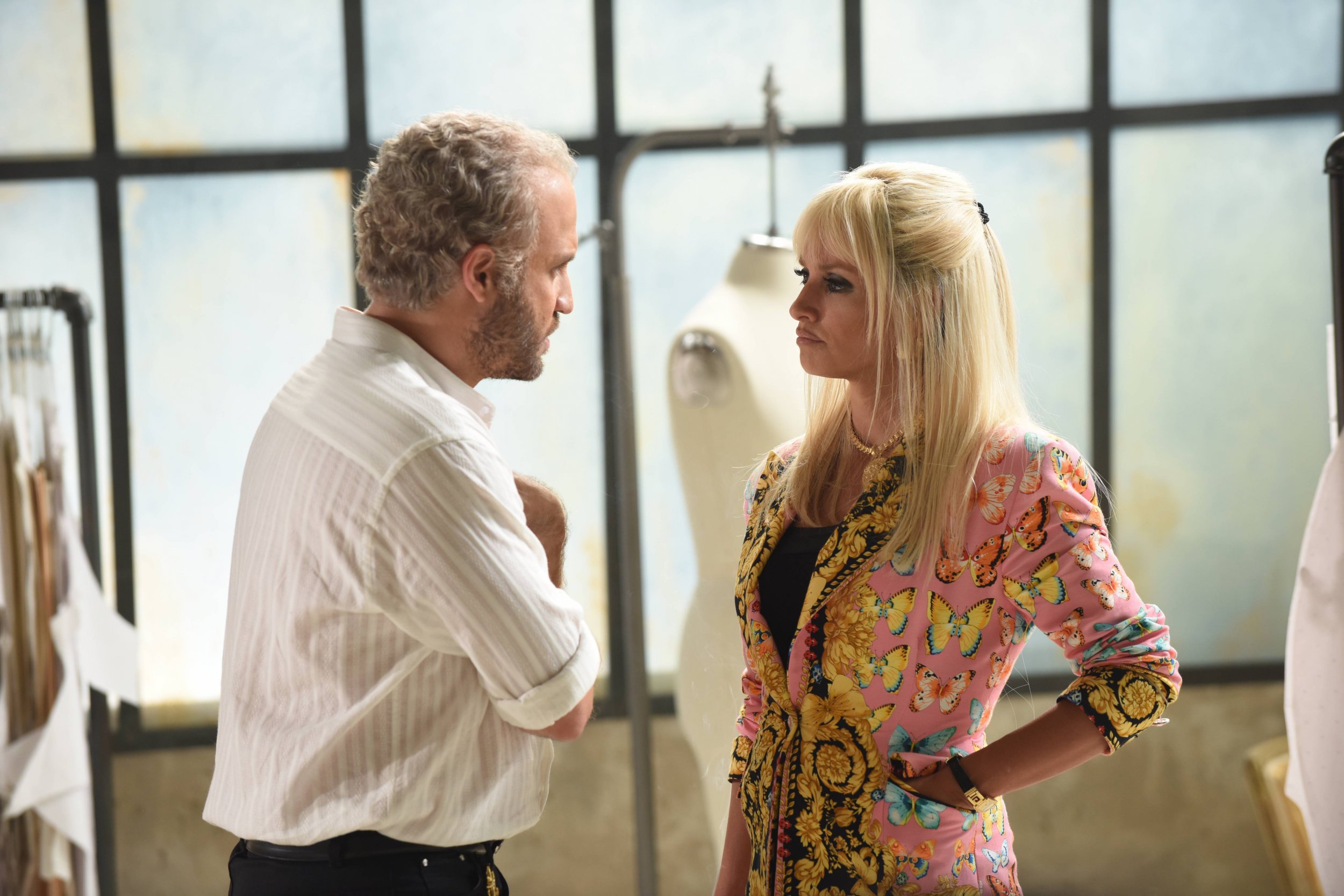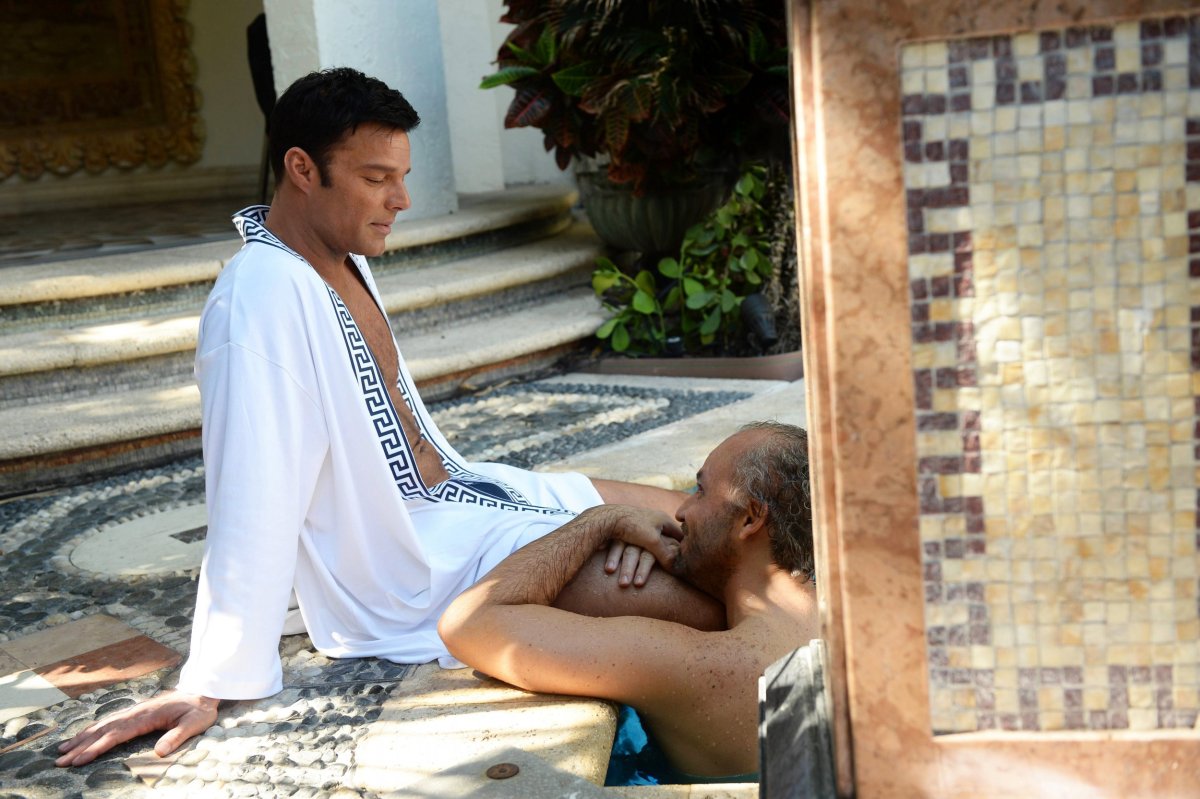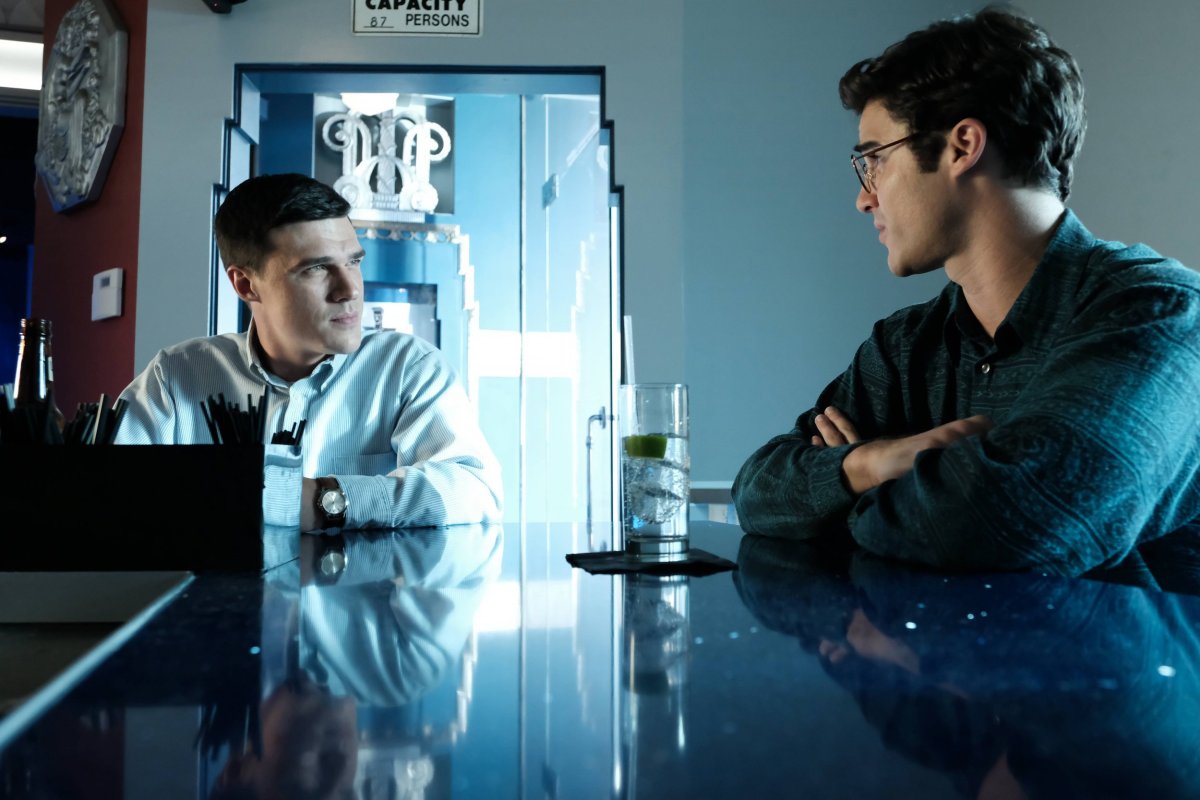
After two weeks without a glimpse of its title character, American Crime Story: The Assassination of Gianni Versace finally gets back to the famed Italian designer. Episode five, "Don't Ask Don't Tell," written by Tom Rob Smith and directed by Dan Minahan, opens on his decision to publicly come out as a gay man.
It's a brief interlude. The episode quickly returns to the story of serial killer Andrew Cunanan, as played by Darren Criss.
Here's what Wednesday night's episode got right and wrong.
Gianni Versace's Coming Out
In the opening scene, Versace (played by Édgar Ramírez) informs his sister Donatella (Penélope Cruz) of his plan to come out publicly, via an interview with the Advocate, an LGBT-interest magazine. This is based on fact: The real 1995 interview was a huge deal for the gay community. American Crime Story showrunner Ryan Murphy, who is openly gay, told Vice the article inspired him when he was younger.
"I remember being so proud and excited when he did that [coming out] interview in The Advocate because at the time there wasn't really a lot of people who were brave enough to live their life in the open," Murphy said. "So for me, I had a great passion for it, and I was very emotional shooting it." (You can read an excerpt of Brendan Lemon's Advocate article, archived on Questia.)
In the episode, Donatella disapproves of her brother's decision. She accuses his boyfriend of 15 years, Antonio D'Amico (Ricky Martin) of seeking fame. It's true that the real Donatella disliked D'Amico—so much so that she pushed him out of the company after her brother died.
In an interview with Advocate, Deborah Ball, who spoke to D'Amico for her 2010 book, House of Versace, said, "[D'Amico] was pushed out of the family because he never got along with Donatella when Gianni was alive. He says he doesn't know exactly why Donatella froze him out."
The show has suggested that Donatella disliked D'Amico because of his promiscuous behavior, and for operating as a sort of pimp for her brother. But her only public remarks about him, in a 1999 The New York Times interview, were not specific. "My relationship with Antonio is exactly as it was when Gianni was alive. I respected him as the boyfriend of my brother, but I never liked him as a person. So the relationship stayed the same."

The real D'Amico denounced American Crime Story's suggestion that before the Advocate interview, Versace was hiding his relationship. In June, Martin spoke to Entertainment Weekly about a scene in which Versace doesn't want D'Amico to touch him in public. Later, the real D'Amico told The Guardian that scene painted a false picture. "We lived like a natural couple, there was never a problem," he said. "It was the right moment for him to come out in public, but everyone involved in our world knew. He never tried to hide who he was."
Incidentally, the line D'Amico is referring to—which would have been in Episode 2, "Manhunt"—did not make the show's final cut.
Jeffrey Trail's Minneapolis Life
Last week's episode opened with the murder of 28-year-old Jeffrey Trail, beaten to death by his friend Cunanan. Episode five provides context for that first murder, one of five in Cunanan's killing spree.
Trail had recently moved to Minnesota when Cunanan paid him a visit in April 1997. As we see on the show, Trail (played by American Horror Story's Finn Wittrock) moved from San Francisco to take a job as a district manager for a propane delivery company. (The company is based in Minneapolis in the episode, but it was actually an hour east of the city, in Inver Grove Heights.) "He didn't know a lot about propane," Trail's co-worker told The Washington Post in 1997. "He wasn't here all that long. We didn't get to know him very well."
The co-worker also said Trail "never got mad," so the scene in episode five, where Trail blows up at his colleague who's asking probing questions about his Navy career, is probably not true.
Cunanan's Visit
The real Cunanan pleaded with credit card companies to grant him an extension to purchase a plane ticket to Minneapolis, as the Chicago Tribune reported and as we see on the show. However, Trail did not accompany David Madson (actor Cody Fern) to meet their friend at the airport. (Madson met Trail through Cunanan, and the two became closer after Trail moved to Minneapolis.)
Madson—whom viewers saw murdered after a hostage situation at the end of last week's episode—picked him up alone. The gold Cartier watch that Criss's Cunanan bestows on Madson when they arrive at his apartment is real, though whether it was accompanied by a marriage proposal is unclear. According to testimonies collected by journalist Maureen Orth, whose 1999 book Vulgar Favors is the basis for the FX show, Cunanan joined Madson and his work friends for dinner, and urged Madson to show off the gold watch. Orth also wrote that Cunanan had previously called Madson "the man he wanted to marry."
The watch scene makes it into the episode, with an appearance by Linda Elwell (Sophie von Haselberg), the co-worker who went to check up on Madson in episode four. The real Elwell did knock on Madson's door when he missed work, but she wasn't the one who Cunanan bragged to about making movie sets in Mexico, as we see Criss do. According to Orth, that was Monique Salvetti, Madson's best friend.

Trail and Madson's Relationship
The series implies Madson and Trail had a romantic relationship, but according to Orth they were just friends. Still, American Crime Story accurately portrays their dynamic in relation to Cunanan. Trail wanted nothing to do with Cunanan when the killer came to visit, even though he had previously been his close friend. Orth writes that Trail once said to Madson, "You can't believe a word he says. He'll say anything to get a reaction." That line is repeated by Wittrock's Trail nearly verbatim. The real Trail also disapproved of Cunanan's involvement in the drug trade—something the show alludes to, but never addresses directly.
Madson, on the other hand, felt more sympathy for Cunanan. One of Madson's boyfriends, Cedric Rucker, told Orth that while Madson was apprehensive about the killer's visit, he couldn't refuse to see him. "He's trying to make a change in his life," Madson reportedly said. "Andrew just needs help." (Stay tuned for how Madson and Cunanan met next week, in Episode 7.)
The Postcard
"I accidentally sent Jeff's dad a postcard," Criss said in the episode. "They don't know that he's gay, I wrote Stan Trail, and not Jeff Trail, and I signed it 'Love, Drew XX.'"
According to American Crime Story, this is why Trail ended his friendship with Cunanan. Most records of Trail's murder, however, cite Cunanan's drug business as the catalyst for their estrangement. Orth wrote that a month before his murder, Trail turned down an offer from Cunanan to join him in drug dealing. This led to a huge fight. "They're going to kill me," Trail reportedly said to a friend, who thought he was referring to his propane job at the time.

The Sister
To get away from Cunanan, Wittrock's Trail goes to stay with his sister. The New York Times reports the real Trail went to stay with his boyfriend at the time. However, it is true that he and his sister, Candace Parrott, were close. In a 1997 guest column for People, Parrot revealed her brother voiced his concerns about Cunanan a few weeks before his visit. "He said, 'I've got another relationship going on, and Andrew has always wanted more,'" wrote Parrott. "We discussed options like rescheduling the trip or saying, 'Come out, but you have to know what the deal is.' We never came to any conclusions."
Trail, the youngest of five, was out to his siblings but not his parents. As she does on the show, Candace said she encouraged him to come out to them sooner. "He wanted to find a good time to tell them. We always told him it doesn't matter—you are loved unconditionally."
Trail's apartment
In the episode, Trail gives Cunanan the keys to stay in his apartment while he flees to his sister's—too nice to deny him a place to stay, but uncomfortable about spending time with him. According to Orth, Trail left the keys under the doormat. Cunanan then spent Saturday night (the night before the murder) on his own there. He took down a phone message for Trail at 10 a.m. Sunday morning, signing it, "Love, Andrew." Later that night, Cunanan left a voice message on Trail's phone inviting him to come over to Madson's apartment. Trail went for some reason, only to be killed with a hammer, as we saw in last week's episode.
While in Trail's apartment, and as we see in the episode, Cunanan stole from the ex-Naval officer, taking his .40-caliber handgun and a box of bullets. That gun was used to kill Madson, Cunanan's fourth victim, 45-year-old William Reese and, finally, Versace.
No evidence suggests that Cunanan shot a gun in Trail's apartment, or that he found a tape of Trail's anonymous interview, as Criss's Cunanan does.
The 48 Hours Interview
The climax of the episode—Jeffrey Trail's anonymous interview with Richard Schlesinger on 48 Hours—is real. You can watch an excerpt from the 1993 interview on CBS. Trail, whose identity is hidden, discusses being a closeted gay officer in the "Don't Ask, Don't Tell" era of the armed forces (thus the episode's title). Twenty years later, Schlesinger confirmed that Trail was the anonymous interviewee.
Trail's military career
Creative liberties were taken here. It's true that Trail was a naval officer and a Gulf War veteran, stationed in San Diego. He was a lieutenant when he left the Navy in 1996 to join a training program for the California Highway Patrol. He abruptly resigned from the patrol a few months later to take the propane job in Minnesota.
But the rescue of another bullied gay soldier, Trail's attempted suicide because of homophobia within the military, and his desperate attempt to carve off his Marvin the Martian tattoo—as we see Trail do in the episode—is pure speculation. It's not a huge leap to suggest that Trail was driven out of the Navy by homophobia, considering the 48 Hours interview. But Trail's friend San Diego friend, Michael Williams, said in a 1997 interview, "He loved the Navy. He didn't want to ruin his career."

Trail and Cunanan's relationship
After much build-up, "Don't Ask, Don't Tell" finally reveals how Cunanan and Trail met in San Diego, though the exact details remain unknown. The show suggests that they met up in a gay bar and Cunanan offered support after Trail's attempted suicide. Again, there is no evidence to support this, or to suggest that he had any shame about being gay. According to Williams, "He did a lot of work for the gay community here, like Project Lifeguard, which has to do with safe-sex programs."
American Crime Story doesn't suggest that Cunanan and Trail had a relationship, and according to Trail's friends and family, they never had more than a friendship. None of them could offer a reason as to why Trail remained loyal to Cunanan for as long as he did. And while, as we see in the episode, he did try to avoid Cunanan in Minnesota, he did not, in the end, avoid him enough.
The Assassination of Gianni Versace airs Wednesdays at 10 p.m. ET on FX.
Uncommon Knowledge
Newsweek is committed to challenging conventional wisdom and finding connections in the search for common ground.
Newsweek is committed to challenging conventional wisdom and finding connections in the search for common ground.
About the writer
Anna is a Newsweek culture writer based in New York City. Previously she was a Film/TV writer at Elite Daily and an ... Read more





